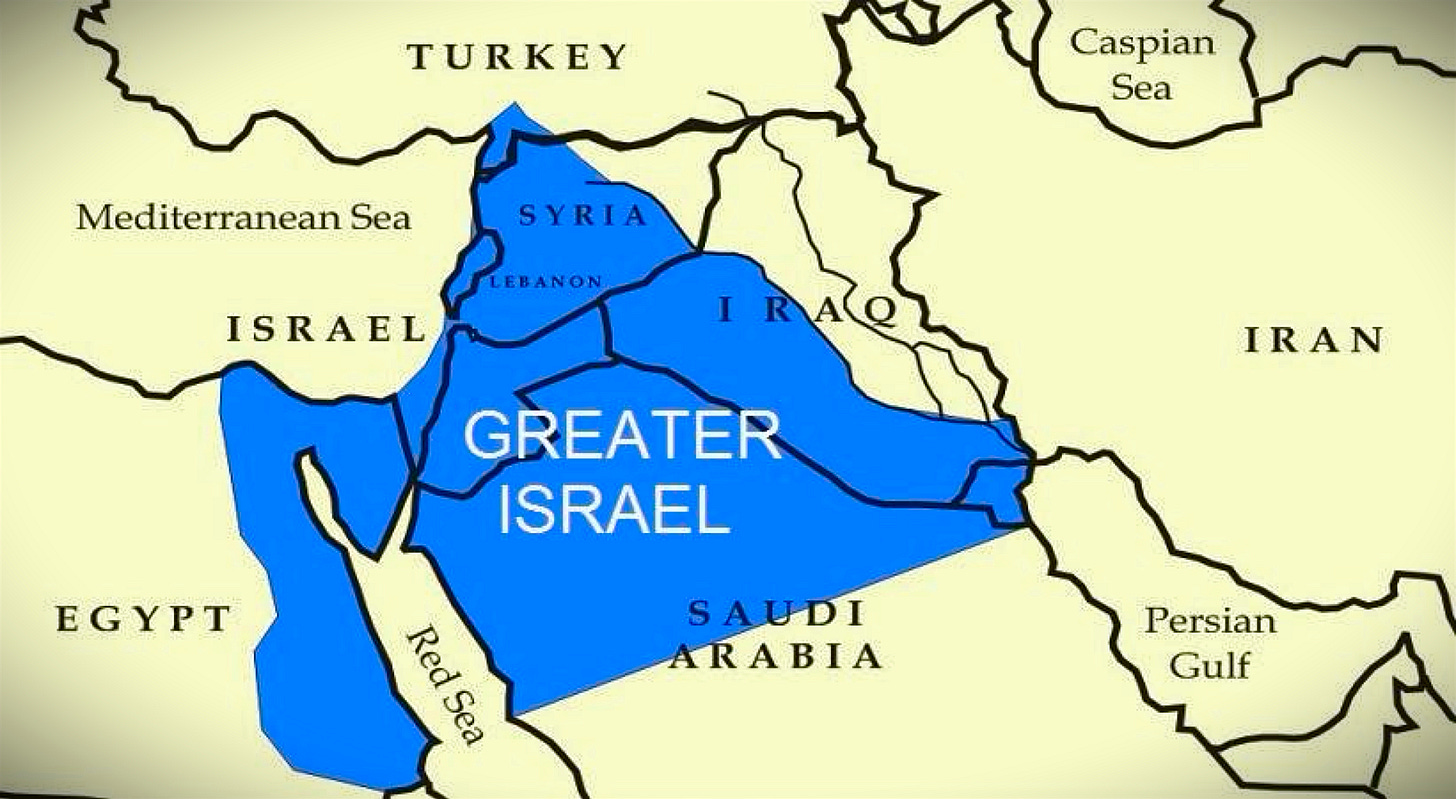The Greater Israel Project: What It Is, Why It Matters... and How Trump’s Gaza Remarks Fit Into the Puzzle
From biblical prophecy to modern geopolitics, the controversial vision of a "Greater Israel" has shaped regional tensions for decades. Given Trump’s Gaza comments, what's coming for the Middle East?
Editor’s Note: I’ve already gotten some semi-argumentative feedback about the existence of a so-called “Greater Israel.” As a result, I’ve added an Addendum at the far bottom of this newsletter that describes “Greater Israel” and how as a contemporary geopolitical concept it ties to the Biblical “Promised Land.”
The Greater Israel Project: A Deep Dive Into the Controversial Vision Shaping the Middle East
The concept of "Greater Israel" has long been a flashpoint in the Israeli-Palestinian conflict… and broader Middle Eastern geopolitics.
Rooted in biblical interpretations and expansionist ideologies, it has fueled regional tensions and sparked debates about Israel’s territorial ambitions.
But what exactly IS the "Greater Israel" project… and how does it connect to recent developments, including President Trump’s remarks on rebuilding Gaza?
Let’s break it down.
What Is the "Greater Israel" Project?
At its core, the "Greater Israel" project is an ideological vision that seeks to expand Israel’s borders to encompass what proponents believe to be the biblical "Promised Land."
This territory, as described in the Torah, includes not only modern-day Israel but also the West Bank, Gaza, and parts of Lebanon, Syria, Jordan, Iraq, and even Turkey.
The term has evolved over time, with different groups interpreting it in varying ways.
For some, it means extending Israeli sovereignty over the West Bank (referred to by some as "Judea and Samaria") and the Golan Heights.
For others, it encompasses a far more expansive vision, stretching from the Nile River in Egypt to the Euphrates River in Iraq—a swath of land that would dwarf the current State of Israel.
This ideology has been embraced by Israel’s political right, particularly the Likud Party, which has dominated Israeli politics since 1977.
The 2018 "Nation State of the Jewish People" law further codified this vision, affirming the Jewish people’s "exclusive and inalienable right" to all parts of the land, including contested areas like the West Bank.
Who Supports It?
The "Greater Israel" concept has found support among both religious and secular right-wing nationalists in Israel.
Far-right figures like Finance Minister Bezalel Smotrich have openly advocated for expanding Israel’s borders… even suggesting that parts of Jordan, Lebanon, and Syria should fall under Israeli control.
Smotrich’s controversial remarks have drawn condemnation from neighboring countries and raised concerns about the project’s implications for regional stability.
The ideology also resonates with certain Christian Zionist groups in the United States who see the establishment of a "Greater Israel" as a fulfillment of biblical prophecy. This alignment has helped solidify support for the project among some American political leaders… further entangling U.S. foreign policy in the region.
What Does It Mean for the West Bank and Gaza?
The "Greater Israel" vision has direct consequences for the West Bank and Gaza, territories that are central to the Israeli-Palestinian conflict.
Roughly 650,000 Israeli settlers currently live in unauthorized settlements in the West Bank and East Jerusalem… areas that are internationally recognized as part of a future Palestinian state under the two-state solution.
These settlements are considered illegal under international law and have been condemned by the United Nations as a "flagrant violation" of Israel’s obligations. However, the Netanyahu government and its far-right allies have continued to support and expand these settlements, emboldened by the "Greater Israel" ideology.
In Gaza, the situation is even more complex.
Gaza, which has been under Hamas control since 2007, is often viewed by proponents of "Greater Israel" as a security threat rather than a potential part of the envisioned biblical land. This perspective has shaped Israel’s approach to Gaza, including its military operations and blockade policies.
Trump’s Remarks on Gaza: A Connection to "Greater Israel"?
President Trump’s recent comments on clearing the war rubble and rebuilding Gaza have raised eyebrows and sparked speculation about their ties to the "Greater Israel" project.
While Trump did not explicitly mention the underlying ideology, his remarks about redeveloping Gaza and ensuring its "demilitarization" align with broader goals of reshaping the region’s geopolitical landscape.
Critics argue that Trump’s approach to Gaza—much like his administration’s policies in the West Bank—reflects a tacit endorsement of the "Greater Israel" vision.
By focusing on Gaza’s reconstruction while sidelining Palestinian political aspirations, Trump’s plan could further entrench Israeli control over the territory… effectively rendering it a non-sovereign entity within a larger Israeli sphere of influence.
This interpretation is bolstered by Trump’s close ties to figures like Jared Kushner, who’s been instrumental in shaping U.S. policy in the Middle East.
Kushner’s alignment with the Chabad-Lubavitch movement, which has its own eschatological vision tied to the "Greater Israel" project, adds another layer of complexity to this new Trump administration’s approach.
The Broader Implications
The "Greater Israel" project is not just a domestic issue for Israel—it has far-reaching implications for the entire Middle East and beyond.
By challenging the internationally supported two-state solution and pursuing expansionist policies, Israel risks further destabilizing an already volatile region.
For the United States, the project presents a dilemma.
While successive administrations have supported Israel’s right to exist and defend itself, the "Greater Israel" vision complicates efforts to broker peace and maintain alliances with Arab states. Trump’s remarks on Gaza, viewed through this lens, suggest a continuation of policies that prioritize Israeli interests over Palestinian sovereignty.
Where to Now: A Vision of Conflict or Coexistence?
The "Greater Israel" project remains a deeply divisive and controversial vision.
For its proponents, it represents the fulfillment of a divine promise and a guarantee of security for the Jewish people.
For its critics, it is a dangerous expansionist ideology that undermines peace and perpetuates conflict.
As the Middle East continues to grapple with the fallout from decades of war and occupation, the question of how to reconcile these competing visions remains unanswered.
Trump’s remarks on Gaza, while not explicitly tied to the "Greater Israel" project, highlight the ongoing tensions and the challenges of finding a path forward.
In the end, the future of the Middle East will depend on whether its leaders can move beyond ideological ambitions and embrace a vision of coexistence… one that respects the rights and aspirations of all its peoples.
What you need to know about Donald Trump's Gaza plan
The “Greater Israel” Plan Has a Colossal Reach
Real estate mogul-turned-president Trump’s ‘owning Gaza’ remark sparks firestorm
What is Greater Israel?
Netanyahu revives the Greater Israel plan
‘Conspiracy Theory’ is Now Fact: Greater Israel Has Arrived
What is the 'Greater Israel' movement?
Smotrich has confirmed that the quest for ‘Greater Israel’ is real
Turkey Sees Rising Threat Of “Greater Israel" Arriving At Its Borders
'Absolutely shocking': Biggest names in news 'propped up' by millions of dollars from U.S. government
Elon Musk: 'Many media outlets are going to experience a mysterious drop in revenue'
Addendum:
The Biblical concept of the "Promised Land" is primarily described in the Hebrew Bible (Old Testament) as the land promised by God to the descendants of Abraham, Isaac, and Jacob.
This land is often associated with the territory of ancient Israel, which includes modern-day Israel, the Palestinian territories, and parts of neighboring countries.
Here's a geographic correlation of how the Biblical "Promised Land" might align with modern geopolitical boundaries:
1. Core Biblical Description
The Promised Land is described in several key passages, including:
Genesis 15:18-21: God promises Abraham a land stretching from the "river of Egypt" (likely the Nile or Wadi el-Arish) to the Euphrates River.
Numbers 34:1-12: Provides a detailed boundary description, including the Mediterranean Sea to the west, the Jordan River and Dead Sea to the east, and specific northern and southern limits.
Deuteronomy 11:24: Describes the land as stretching from the wilderness (Negev) to Lebanon and from the Euphrates to the Mediterranean Sea.
2. Modern Geopolitical Correlations
Southern Boundary: The "river of Egypt" (Wadi el-Arish) aligns with the northeastern Sinai Peninsula, near the modern border between Egypt and Israel.
Western Boundary: The Mediterranean Sea remains a clear western boundary, corresponding to Israel's and Gaza's coastline.
Eastern Boundary: The Jordan River and Dead Sea form the eastern boundary, aligning with the modern borders of Jordan and the West Bank.
Northern Boundary: The northern limits described in the Bible (e.g., Mount Hor, Lebo Hamath) roughly correspond to southern Lebanon and parts of southwestern Syria, including the Golan Heights.
3. Key Regions and Modern Equivalents
Negev Desert: The southern part of modern Israel, extending to the Sinai Peninsula.
Judea and Samaria: The West Bank, including areas like Bethlehem, Hebron, and Nablus.
Galilee: Northern Israel, including the Sea of Galilee.
Coastal Plain: The Mediterranean coastline, including cities like Tel Aviv and Gaza.
Transjordan: Parts of modern Jordan, particularly areas east of the Jordan River, such as Gilead and Ammon.
4. Euphrates River Inclusion
The Biblical promise extending to the Euphrates River (Genesis 15:18) would include parts of modern-day Syria, Iraq, and possibly southeastern Turkey.
This is a more expansive interpretation and is not reflected in modern Israeli borders.
5. Modern Political Realities
The modern State of Israel controls much of the core Biblical “Promised Land”, including the Negev, Galilee, and coastal plains. However, the West Bank and Gaza Strip are contested territories with competing claims by Israelis and Palestinians.
The northern and eastern boundaries described in the Bible extend beyond modern Israel's internationally recognized borders, encompassing areas in Lebanon, Syria, and Jordan.
6. Geopolitical Implications
The concept of the “Promised Land” remains deeply significant in Jewish, Christian, and Islamic traditions, influencing religious and political narratives in the region.
Modern geopolitical boundaries are shaped by historical events, such as the British Mandate, the 1948 Arab-Israeli War, and the 1967 Six-Day War, rather than Biblical descriptions.
The Biblical "Promised Land" roughly corresponds to modern Israel, the Palestinian territories, and parts of neighboring countries.
However, the expansive interpretation (e.g., including the Euphrates) goes beyond current geopolitical realities.
As you well know, the region remains a focal point of religious, historical, and political significance.







“For others, it encompasses a far more expansive vision, stretching from the Nile River in Egypt to the Euphrates River in Iraq—a swath of land that would dwarf the current State of Israel. This ideology has been embraced by Israel’s political right, particularly the Likud Party, which has dominated Israeli politics since 1977.” This is patently false. No political party in Israel advocates this, certainly not Likud. Your article ignores vicious, murderous Islamic jihadism, which endangers people all over the world, not only Israelis. The first Jihadi pogrom against Jews in Palestine/Israel - which included beheadings and rapes - occurred in 1929, long before there were any “illegal” “settlements”. And your article ignores the fact that Israel unilaterally withdrew from Gaza in 2005 in an attempt to arrive at a peaceful resolution. This ultimately resulted in the Islamic, jihadist act of war of Oct 7, 2023. The Palestinian Authority, which pays jihadist terrorists to murder Jews (“pay to slay”) is not much better than Hamas. In brief, your allegation that “By challenging the internationally supported two-state solution and pursuing expansionist policies, Israel risks further destabilizing an already volatile region” is dead wrong. Israel needs to defend itself from the deadly, fanatic ideology of its neighbors. It is their murderous intentions - and not a supposed “expansionist” ideology of Israel - that endangers the peace and stability of the entire world, including but not limited to the Middle East.
Gave up at "Rooted in biblical interpretations and expansionist ideologies, it has fueled regional tensions and sparked debates about Israel’s territorial ambitions." ...... Evidence please, because I know my bible a bit.